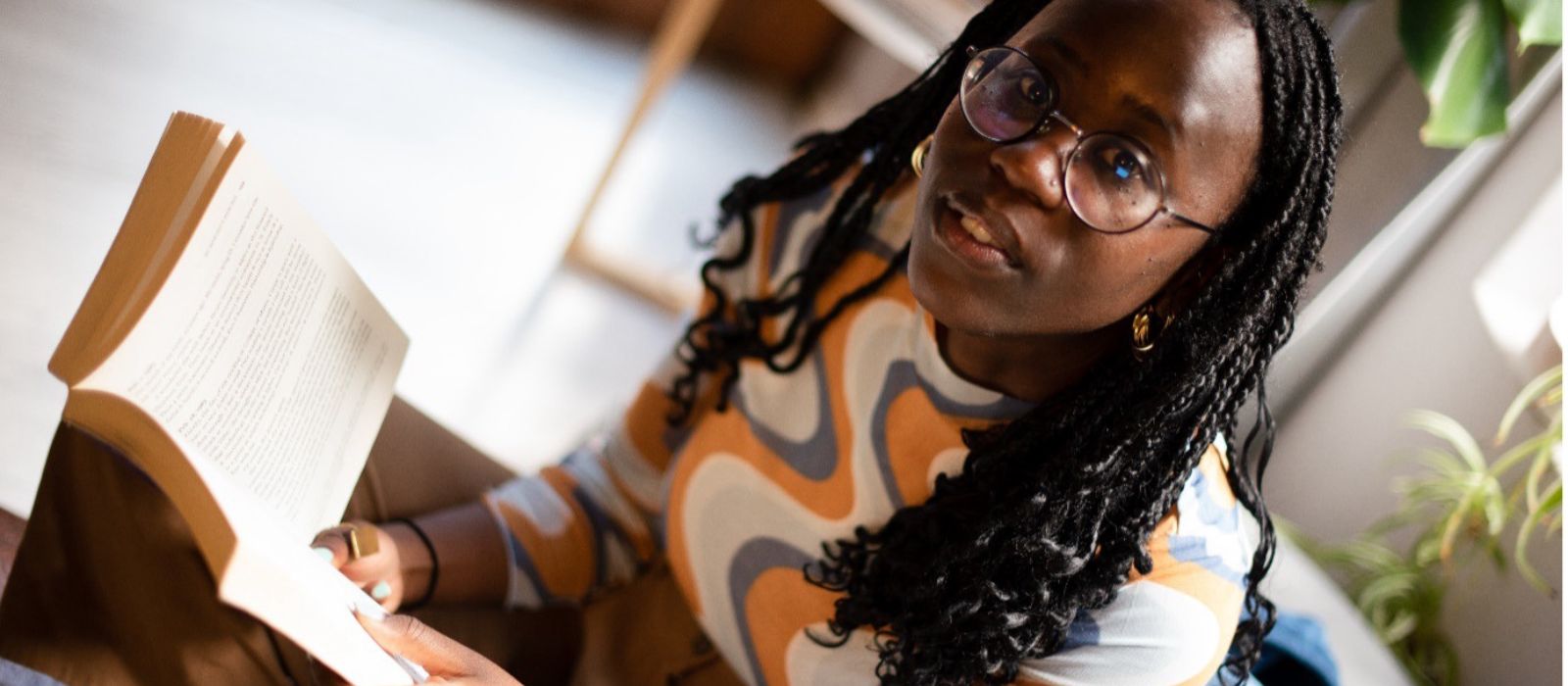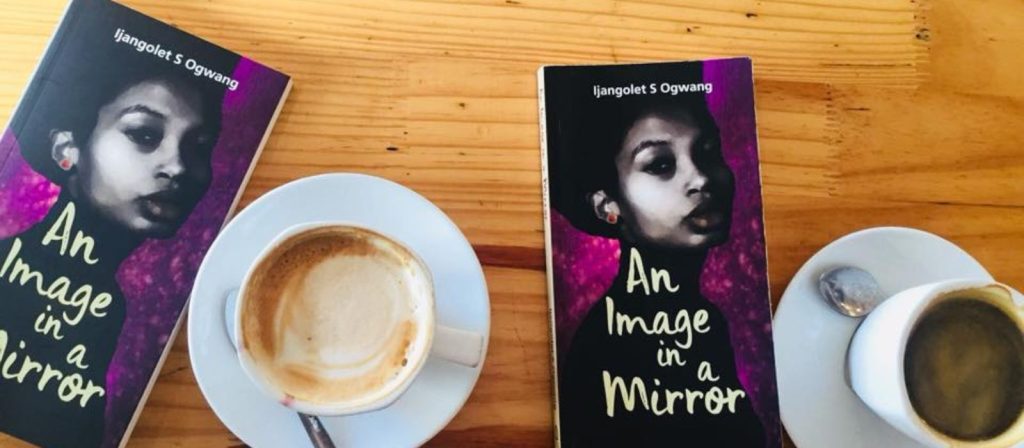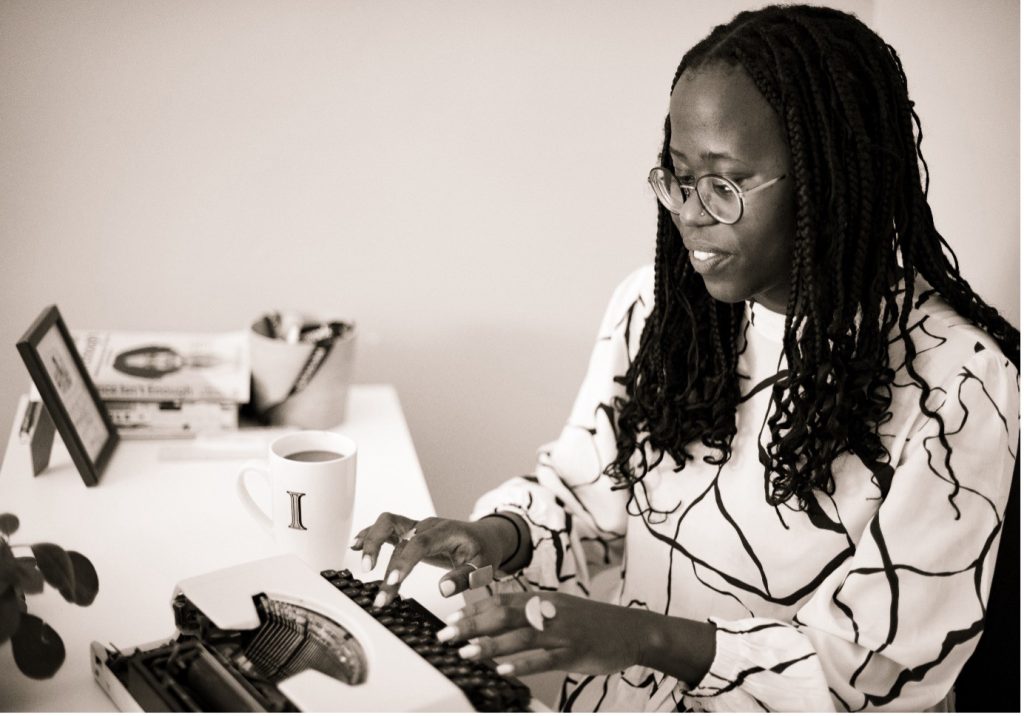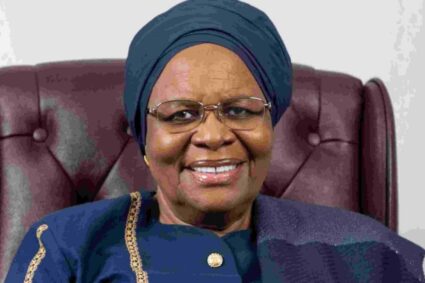
Ijangolet Sharon Ogwang is a creative force with a voice that demands attention. Born in Kenya to parents of Ugandan heritage and raised in South Africa, her debut novel, An Image in a Mirror, was released in 2018. It has since sold thousands of copies, becoming a national bestseller in South Africa and has been incorporated into the curriculum of three schools.
The novel centers on a pair of twins who are separated by their mother; one stays in rural Uganda while the other is sent for a better life in South Africa. We sat down with Ogwang to gain more insight into her creativity, her work, and more. KM – Kudzai Mhangwa, IO – Ijangolet S. Ogwang
KM: Thank you for agreeing to sit down with us, Ijangolet! Let’s start there: who is Ijangolet Sharon Ogwang?
IO: I am easily moved by the way everything else is moved. I’m moved by who we are, how we got here, and the tiny miracles that make up our lives. I’m moved by love. I’m moved by hope and the possibility that better is possible. I’m moved by what hurts and what is beautiful, and all the trying in between. Practically speaking, I move between writing and my day job, which focuses on eradicating poverty through investing in impact ventures that make life easier for people. I am a lover, daughter, sister, and friend.
KM: Your ancestry is also interesting. You are Ugandan, born in Kenya, and raised in South Africa. How has that identity shaped you?
IO: My Ugandan parents were young and in love in Kenya, hoping to create a better world for my siblings and me. Somewhere in their love story, I was born. The political situation at the time made them leave Kenya and move to a small town in South Africa, where some of their friends lived. I like to say I am of East African lineage and South African socialized, but more than anything, it has made me Pan-African in how I move through the world. In a time where Afrophobia remains rampant, I find this identity central to who I am.
KM: How has that experience been for you as a person and as a writer?
IO: I see the world in stories. On my best days, each encounter with a person feels like an invitation into a world. I love days like this when I feel most myself—when I listen, when I am moved. Writing on those good days has made me a better human, able to hold conflicting views with equal weight in my mind, compassionate and ceaselessly curious.
KM: How do your personal experiences show up in your writing?
IO: My earliest lesson was that to leave home means an endless remaking of home—a tireless recounting of memories, lest you forget them in your bones, on your tongue, and in your very breath. This idea of home, of leaving and returning, is a theme that continually shows up in my writing. The idea of a country, space, and place—how these things make us, and we in turn make them—is something I think about incessantly. My first novel, An Image in a Mirror, tells the story of twins living in two different realities, one in suburban Johannesburg and the other in Uganda. My forthcoming novel moves between Uganda and South Africa, with trips to Ghana and Zimbabwe.
KM: You are the author of An Image in a Mirror, which has become a national bestseller in South Africa. Congratulations! Tell us a bit more about your book.
IO: Thank you! The question “Who would I have been if my parents had not moved to South Africa and I grew up in Uganda?” has always stayed with me in various forms. This is one of the central themes that An Image in a Mirror explores through the life of Nyakale, who is separated from her twin Achen, her mother, and her country. Nyakale grapples with the question, “Who would I have been if I had stayed?” In her case, “Why did I leave?” She observes her uncle and aunt wrestling with this question, holding it close to their hearts. Achen, on the other hand, lives with the weight of being the one who stayed but lost parts of herself when Nyakale left. Ultimately, An Image in a Mirror is a coming-of-age story of twins, questioning how much of us is shaped by nature versus nurture. It delves into this meta-theme by comparing the girls’ experiences with universal feelings such as love, purpose, and finding one’s place in the world—a place where one can simply be, without needing to explain.
KM: When did you start writing the book, and when did the inspiration to write it hit you?
IO: I started writing An Image in a Mirror in 2016, and it was originally published in South Africa in 2018. It was recently republished in April 2024 in the United Kingdom.
KM: How was your journey to publication?
IO: I was lucky that one of the first four publishers I approached agreed to publish the book. The journey was honestly beyond anything I had imagined. The book was integrated into the curriculum of four schools. I was shortlisted for the UJ Debut Novel Prize and long-listed for the Dublin Literary Award, one of the biggest global literature awards. It entered homes far and wide, but more importantly, it entered hearts. Hearing how the story moved and continues to move people never loses its novelty.
KM: As I read the synopsis of the novel, the character Nyakale seems to have experiences similar to yours. Is that true? And do you make an effort to create characters that are similar to you?
IO: I drew from parts of my reality and from my friends’ lives, but these were just pieces that came together to make Nyakale a real character. Her experience and voice are hers, although she carries pieces of the different worlds I’ve been lucky to witness.
KM: I also came across this quote from the book: “We are in this country and ours is not to stand out but to survive.” As a person of East African heritage, have you ever felt this way growing up in South Africa?
IO: I particularly remember feeling this way as a child. I remember my parents and their friends having these kinds of conversations in the living room. I would sit in the corridor and listen in on conversations that weren’t meant for me. The experiences of Africans who leave their home and move to other African countries have always fascinated me, especially the ways we struggle with Afrophobia. In a world of limited resources, I understand where it comes from, but it is disheartening to see.
KM: A cheeky question: any new work on the horizon?
IO: Bark, Bite, Kisses is my forthcoming novel, but unfortunately, I can’t share a concrete date yet. There is also a short story collection that I adore, which I’m refining, holding close, and making more tender. That’s what I’m currently working on.
KM: Who do you hope to become as an artist, and what would you like your legacy to be?
IO: I want to write the sort of stories that stay with people—the sort that move people and make them feel less lonely. I want to create characters that linger long after you’ve closed the book. I want young Black girls to read my work and be inspired to write their own. On a personal level, I aspire to be a globally acclaimed writer, read far and wide across the world, in countries whose names I can’t pronounce. Winning the Booker Prize and the Pulitzer Prize would be phenomenal.
KM: Do you have a writing routine?
IO: I used to have a routine, but adulting has made it difficult lately. I’m figuring out a new routine now. At the moment, it’s just about trying to write whenever I can. However, I am a believer in routine, in trying to sit for the same hours every day. With my first novel, I did that, and over time it felt like my spirit almost automatically knew it needed to be creative during those hours, and the story would just come to me.
KM: Who are your greatest writing inspirations?
IO: There are so many voices that have influenced me. Historic figures like Toni Morrison—I love Sula and Jazz. Then there’s James Baldwin—If Beale Street Could Talk could not be more perfect. Chimamanda Ngozi Adichie, whose work I read in my twenties, tipped me over into believing I could write. I love how poetic Ocean Vuong writes. Then there are the journals and essays of Alice Walker. Jennifer Nansubuga Makumbi, a prolific Ugandan writer, and Tsitsi Dangarembga’s Nervous Conditions haunted me. There are so many more names I could list.
KM: Who is Ijangolet outside of being a writer? What do you do for fun?
IO: I love all other forms of art that I can’t create. You’ll find me at live music shows, paint-and-sip events, art galleries, and curated experiences. I jog often—it’s a nostalgic activity because I used to run track growing up. I love watching tennis. I enjoy spending time with people I love, eating good food, drinking wine, talking, and laughing. I also adore being in nature and traveling. I’m honestly a little greedy for all life has to offer.
KM: It has been such a delight speaking with you. Any final words for the readers?
IO: I hope you live.





